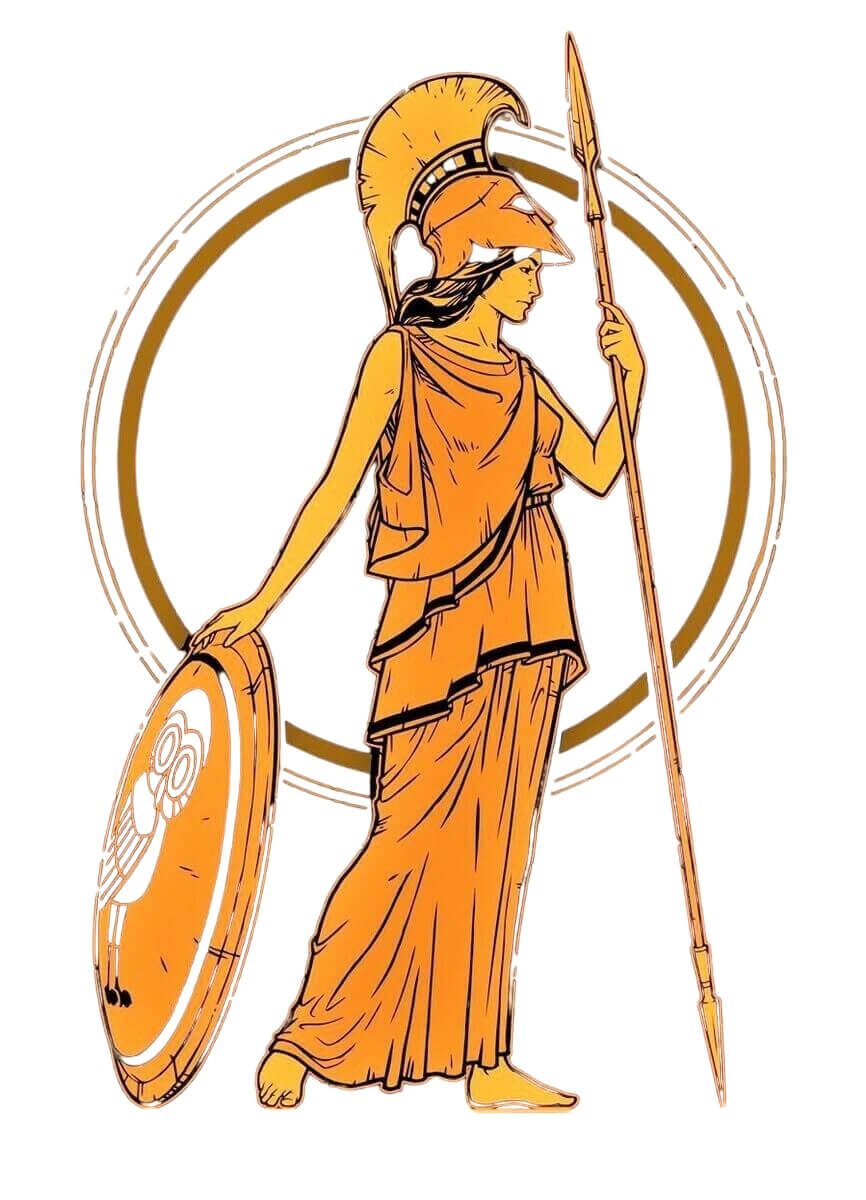Ares: Greek God of War and Spartan spirit of strength
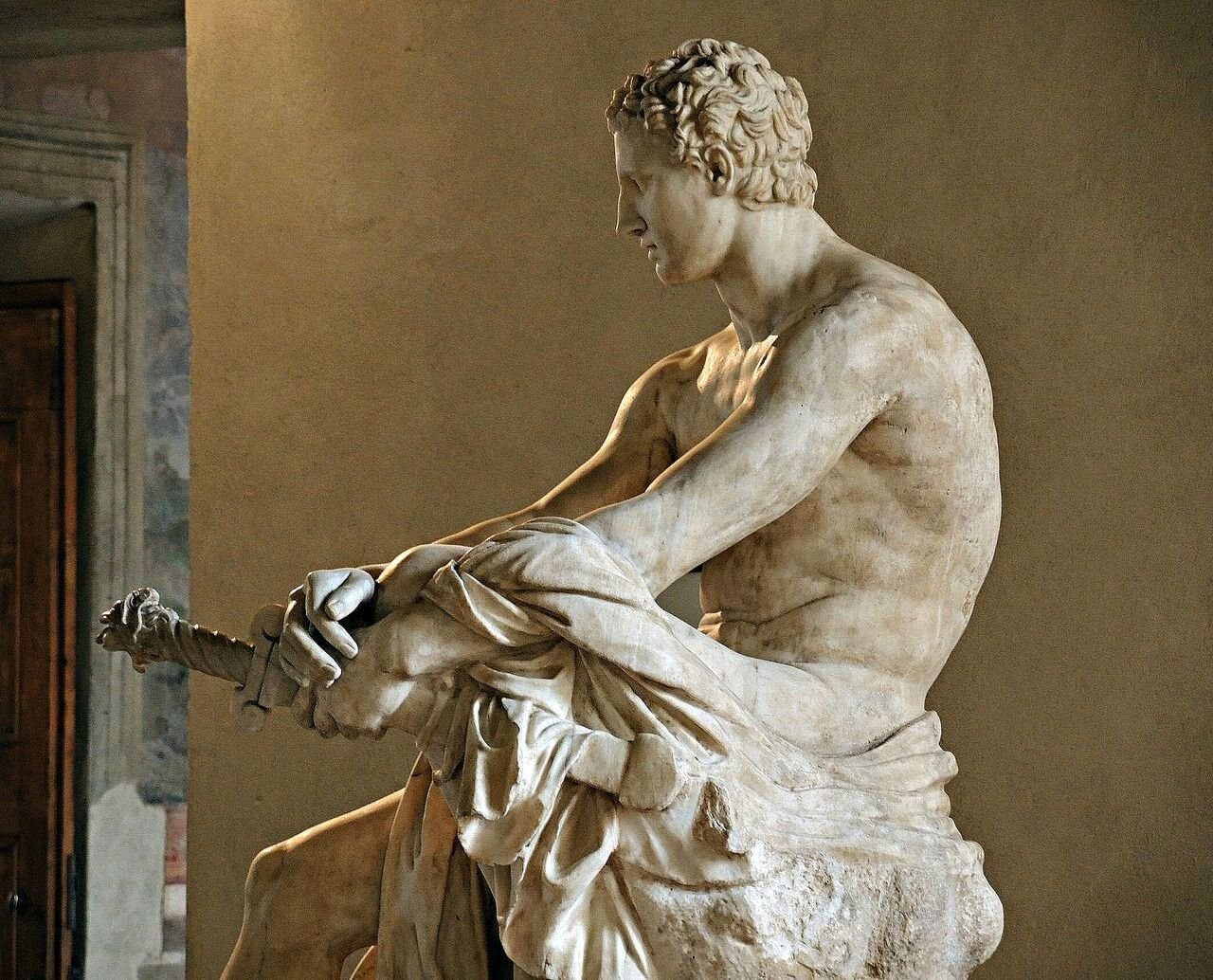
In Greek mythology, Ares is the god of war, courage and battlelust. He usually personified the most terrible aspects of the battle and wasn’t very popular among the Greeks. Only the Spartans extoled and appreciated his rage, bravery and strength, that suited perfectly to their military city-state. In ancient legends Ares represented the invincible way of the warrior and only Athena, the goddess of wisdom was able to defeat him.
The birth of Ares
According to the ancient Greek poem Theogony by Hesiod (730 BCE – 700 CE), the god of war Ares is the son of Zeus and Hera. Among his brothers and sisters on Olympus he was the only important deity, conceived in a usual way.
Nonetheless later roman myths about Ares proposed a very different story. According to Ovid, one of the greatest poets of Rome, Ares had been born in a very uncommon way. One day Hera became enraged with Zeus, because of having given birth to Athena from his forehead. For that reason, she went to complain about her woe to Oceanus, the titan son of Uranus and Gaia.
However, on her way to the sea she ran into Chloris, the goddess of flowers and spring. She managed to soothe Hera’s mischance, having advised her to get a magic flower from the fields of Olenus. In effect it would permit her to conceive a child on her own. Thereupon when Hera found and touched the spellbinding bloom, the fearless god of war Ares was born.
Ares on the battlefield
Only fierce battles can please the god Ares. He admires it when all the best heroes fall dead to the ground. In glaring armor and with his cherished steel xyphos he rushes frantically among the fighting men. At this time his two sons, Phobos (“Fear”) and Deimos (“Terror”) follow him between the warriors in fight. Meanwhile his main helpers – the goddess of discord Erida, and bloodthirsty Enio, inspire confusion and fright among the combatants.
The battle boils and rumbles from one side to another. Ares, splattered with blood and grime, exults as a demon. He chops indiscriminately left and right, thence mounds of wounded bodies pile up around his feet. He utters a triumphant cry meanwhile he slays a warrior with his amazing sword, and rejoices at his early victory.
As a matter of fact, nobody can deal with the incredibly furious and untamed Ares. Although, if too many heroes lose their lives because of him in a battle, Zeus demands Athena to intervene. Hereafter the fearsome god of war is easily subdued by the goddess of wisdom. Athena defeats Ares with her military strategy and forces him to leave the battlefield.
Ares, Aphrodite and Hephaestus
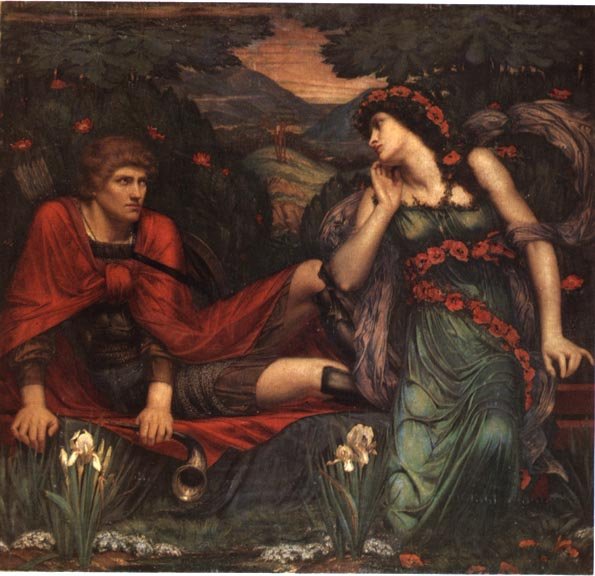
Between the Olympians, the god Ares is very attractive: he is strong, athletic and tall. For that reason, Aphrodite could not resist his beauty. Hence she began to meet him in secret, cheating on her husband, Hephaestus, behind his back.
That being so, the benign master of the forge ignored completely the delirious involvement of his wife. However, one day the god Helios, found out about the Aphrodite’s dalliance with Ares and told everything to his genius friend. Hephaestus had plotted an ominous revenge.
Henceforth he entangled the passionate lovers in a thin bronze net, in which they floundered like two fishes caught in a seine. Thus all the gods invited by Hephaestus, had laughed with great delight at them. When Ares and Aphrodite had finally managed to get out, Hephaestus demanded his dowry to Zeus. According to the Iliad of Homer he got divorced from the goddess of love, leaving her charming body at the entire disposition of his youthful counterpart.
On his side Ares had triumphed as a father and progenitor with Aphrodite. Insomuch as they had many sane and unconventional children together: Deimos, Phobos, Harmonia, Eros, Anteros, Pothos, Himeros and Adrestia.
The God of war and Athena
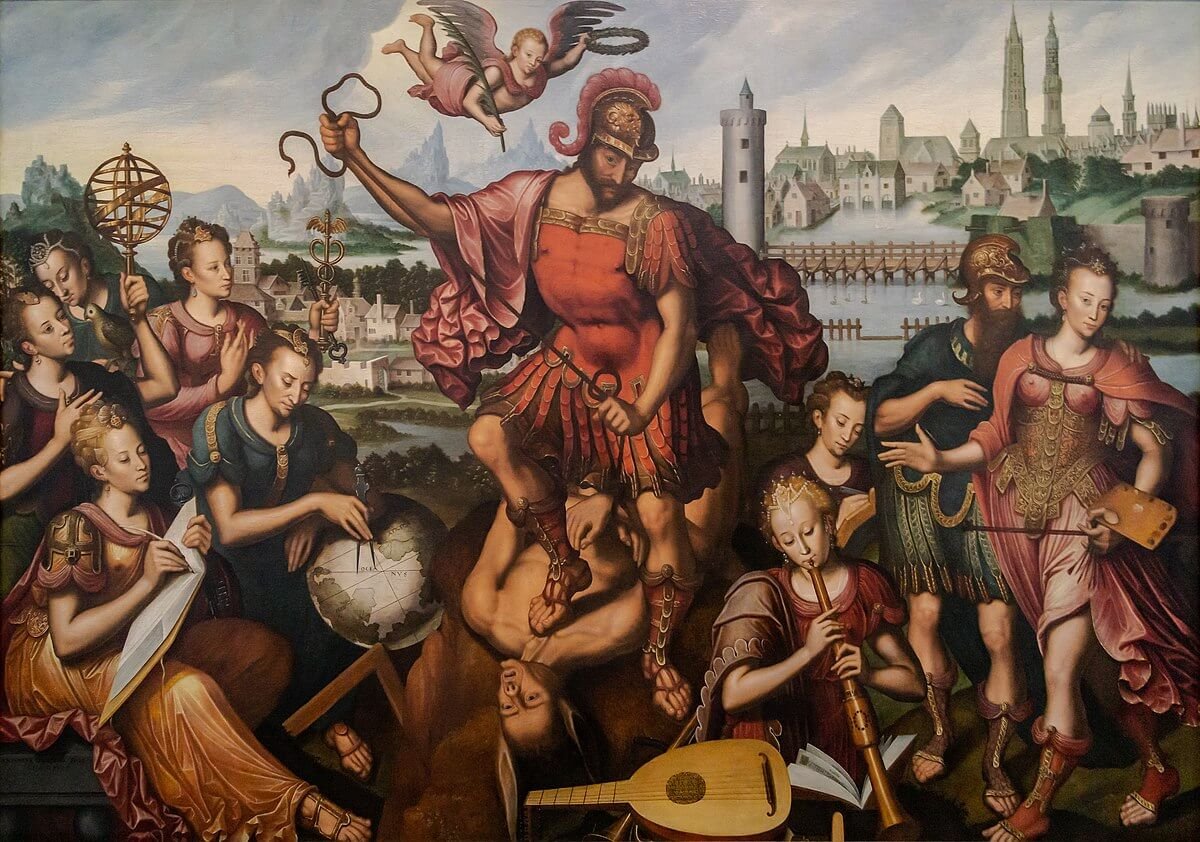
Despite his mighty appearance and fearless character, Ares had lost in several occasions to his adversaries. In the battle of Troy, the hero Diomedes, wounded him with a spear, while being encouraged by Athena and Hera. Athena had really helped Diomedes with the spear and Ares had to retire from the battlefield, being seriously injured. Thereafter the god of war was unwilling to forgive his failure and tried to avenge his honor.
A time after, when Zeus allowed the combatants to join the battle again, Ares attacked the goddess of wisdom. Full of wrath and fury he had assaulted her savagely, but she had vanquished him immediately, striking his muscled body with a rock.
Ares and the Aloadae
At one time Ares had also been captured and jailed. Once upon a time there lived the Aloadae, Otus and Ephialtes, sons of Poseidon. They were enormous, strong giants, who pretended to overthrow the gods from Olympus to earth by mounting on each other the mountains Pelion and Ossa. By that time, they captured the god of war Ares.
According to the Iliad, they locked the mighty immortal in a huge bronze barrel for the entire thirteen months. On this occasion the stepmother of the Aloadae, Eriboea disagreed with them and had alerted Hermes about the Ares’s imprisonment. Henceforth the god of trade acted carefully and after having infiltrated the hideout of the giants managed to free Ares.
Perhaps this misadventure was the most humiliating for the god of war, although his enemies got their appalling punishment. Conforming to Odyssey and Iliad Apollo killed them, before they could raise the full growth of their beard. On the other side and according to other versions of the story the Aloadae killed each other simultaneously. Insomuch as they pursued Artemis, almost managing to trap her, but she turned into a doe to escape quicker. Then again they hurled their spears at her, but she crossed in the middle and they pierced each other to death.
Ares loses his fight against Heracles
Heracles had also defeated Ares in one occasion. He had killed his terrible son Cycnus, because he tried to build a temple in honor to his father, using the skulls and bones of the travelers, who dared to wander by the roads of his dominion in Thessaly.
Apollo managed to whip Heracles up into a rage against Cycnus, while he was passing through Thessaly, accompanied by his nephew Iolaus. As a consequence, Heracles and Cycnus had a fight to death. The tellurian son of Ares, received a mortal strike with a spear in his neck and perished immediately afterwards. Hence the god of war went into a rage and decided to slay Heracles. Meanwhile Athena advised and helped the hero, urging Ares to stop and put his spear aside. The legendary hero hastened to use his opportunity, when Ares stayed vulnerable to an attack and held only a sword. Therefore he struck him right in his thigh with a spear. The god of war fell down injured to the ground, but had been immediately rescued by his sons Phobos and Deimos, who took him back to Olympus.
Ares and his earthly children
More violent and cruel than Ares, had lived his children born of the mortal women. The king Diomedes of Thrace had fed his horses with the meat of travelers who wandered into his domain on the shores of the Black Sea, until he was slew by Heracles as a part of his eighth labour.
The king of Pisa Oenomaus killed eighteen grooms of his daughter Hippodamia, during a chariot race. The suitors craved to win the competition in order to marry her, but instead of receiving a prize, all them ended slaughtered by Oenomaus, who fastened their heads to the wooden columns of his palace.
On the other hand, Phlegyas, the king of Lapiths and son of Ares set fire to the temple of Apollo in Delphi. He provoked the god of music to use his shining arrows against him. Therefore, Apollo had slew and condemned Phlegyas to Tartarus after his death.
Ares’s Meaning in Greek Mythology
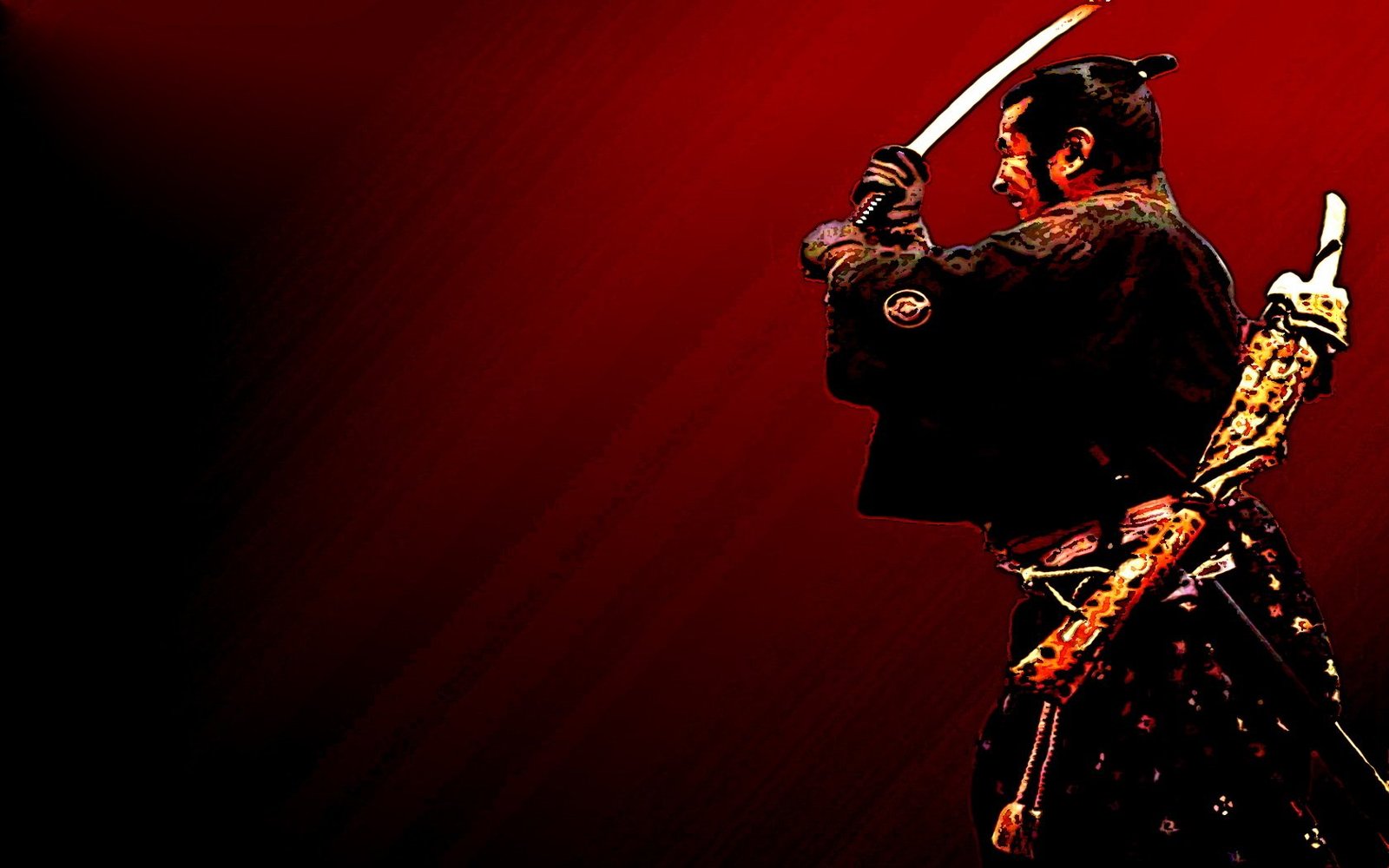
As a god of war Ares is almost invincible and completely impressive on a battlefield. He is an ideal of soldier, full of strength and courage. He would never give up his sword or abandon a battle because of impossible. Therefore, he is the way of an invincible warrior and the hate of physical supremacy against the simple type of man.
Ares is this kind of a general that leads his soldiers onto the battle, going ahead and attacking first, believing in his unbreakable physique and unfailing shape of the sword and military honor.
Only the steel of Xiphos and harsh military training are good enough as to assure the victory in a battle. Science, philosophy and strategy are not trustworthy. Nonetheless is precisely the goddess of science, philosophy and art, the one who defeats Ares and inspires his opponents. Athena is stronger than Ares. As an illustration she uses the levitation of a big stone to knock out the warrior and thwart his strength. She had also encouraged Diomedes to hurl his spear at the invincible Olympian under the walls of Troy. That being so Athena advised and helped Heracles to defeat the god of war. She put aside the spear of Ares and he stayed exposed to the attacks of the hero.
Therefore, the Greek myths about the defeats of Ares not only emphasize his main contenders (Athena, Poseidon), but also explain the role of Athena and Poseidon as saviors and guiders of Sparta, which is personified by Ares in the Greek legends. Athena and Poseidon pretend to guide the god of war for the sake of the Spartan future in particular and for the sake of Greece in general, regarding the Spartan downfall in scientific and political progress as a consequence of its exaggerated dedication to war and military perfection.
In fact, and from the perspective of Athenian philosophers, although Sparta is a superior military state, it is not able to extend its political hegemony in times to come.
To clarify, Ares is not valid for the role of a name-giving patron. In fact, the god of war is another type of myth about name-giving and the contestants are still the same: Poseidon and Athena. Poseidon personifies the transformation of Ares into a military democracy and Athena embodies the Ideal State of wisdom (Political system of chess by Athena and Perseus).
Athena and Poseidon and the name-giving of Ares
According to the legends, the giant sons of Poseidon (Aloadae) capture and imprison Ares in a bronze jar. Pelops defeats the cruel king Oenomaus, after having obtained a pair of winged horses from the god of the sea, as a result of his pleadings. But only Athena faces her brother Ares directly, sending him straight away to the ground.
To emphasize, the Ideal State of wisdom (Athena) is much stronger and propitious, than an organized military democracy, personified by Poseidon. Although Poseidon represents a much better future for Sparta than Ares. He is an elder type of military state, that had transformed into democratic and propitiously civilian. This state had fomented the arts, philosophy and science for the progress of the nation, and the civilians are not forced to become warriors.
In other words, the myths about the defeats of Ares had also represented the grade of the name-giving. Athena is the main defeater of the indomitable Spartan military perspective, represented by the god of war himself.
For certain, the government of arts, science and philosophy and its council of visionary scientists, philosophers and artists working together with a naturally born anarchist leader such as Perseus, or an anarchist, that had been made leader of the nation (Theseus) is likely to obtain better results, than a well-organized government of warriors (Poseidon), which treat all the civilians as full members of his amazing ship crew.
The Greek ship, crossing the seas to the further beyond of the known world is a metaphor of the natural social hierarchy, fully made to end with favoritism and corruption. It must be reached through the extended use of military ranks and respectful disposition of civil professions.
Therefore, Athena or Poseidon could have changed and guided Ares, embodied by Sparta. Unfortunately for the mankind and the political future of Greece, it never had happened. Ancient Greece never controlled the entire planet and galaxy. The Greeks never had built the blooming republic of freedom. Instead of a great utopian mechanism, it had been a large number of workers, who sustained the sky in role of Atlas.
Sparta, so much as the god Ares never improved properly. They just declined and disappeared as a state and ideology of invincible warriors after their defeat by Boeotians at Leuctra in 371 BCE.
On the other side the great conqueror Alexander the Great of Macedonia managed to extend Greece and its power, far beyond its original borders, but died very young and didn’t perpetuate his glory by dint of a solid political system. The government of philosophers and visionaries could have been the solution. But as it seems to be, the teachings of Aristotle had fallen on deaf ears. The ideas of great thinkers and philosophers from Athens stayed aside and fabulous decade of Ancient Greece had come to an end.
The god of war and Zeus
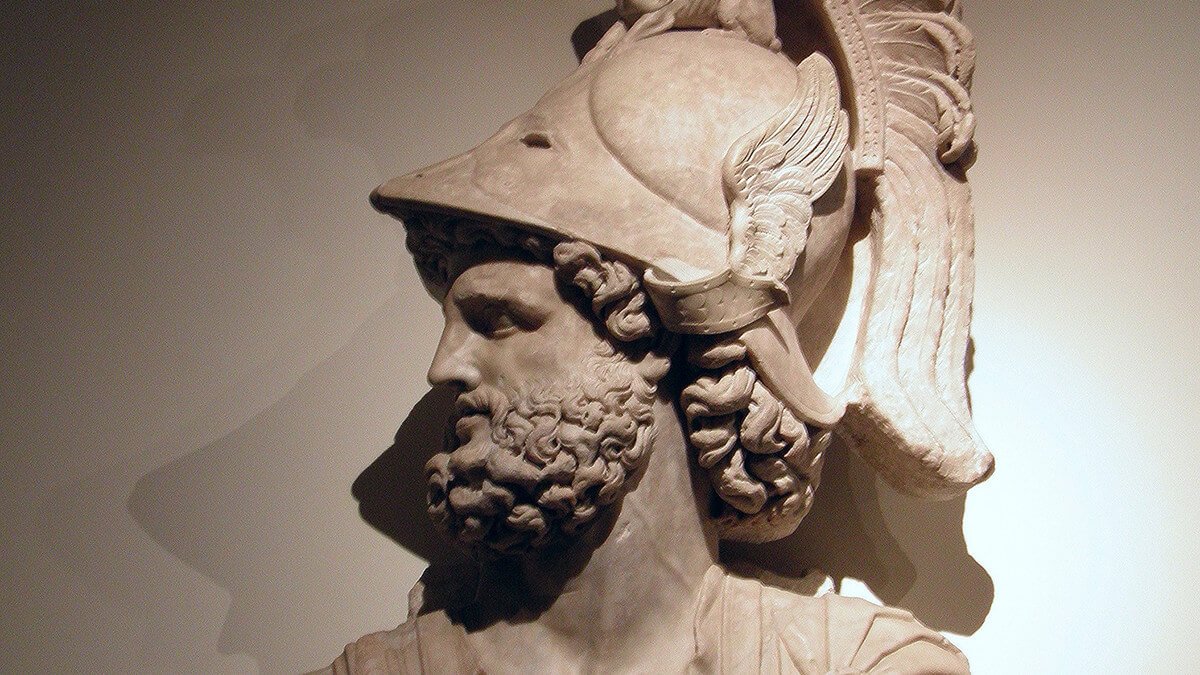
The supreme god of Olympus hates and detests Ares. Because the god of war can provide a deadly blow to the simple way of his pointless hebetude in any future moment to come. The plump, envious king of Olympus never had been a good swordsman. In fact, he always used the unjust laws of Hera, her social organization of despair and despotic eyes of Medusa to frustrate the victory of champions and maintain his unjust supremacy over the world.
Peasant or king, Zeus never was fond of military training and sport. Only joyous long evenings with idle and compliant maidens, felt his stomach with cheer. However, although of being more glorious than his father, Ares is too brutal and unconcerned about human lives and politics.
Ares has many terrible children, who worsen the disgusting image of their Olympian progenitor. At all events it must be a reference to the idea of the first king, who was a great invincible warrior and amazing conqueror, but never had thought beyond the extraordinary use of his sword and muscles. As a consequence, his ordinary children and hairs weren’t forced to obey a solid political system of their forebear and had destroyed everything that their amazing forefather had built.
Ares in the eyes of Ancient Greeks
Ares never had been the favorite god of the ancient Greeks. In fact, only few communities in Greece had worshiped Ares. Between them, the Spartans venerated the god of war as an important deity. Insofar as the fearsome god of war managed to express their ideal of courage and indomitable spirit of military honor.
As it used to happen simple people hated Ares in the same way as Zeus abhorred the winners. However, the god of war responded them with gracious bloodshed and impressive hatred. The heroic personality managed to overwhelm the pathetic way of weaklings and morally promiscuous slaves.
For that reason, the god Ares had been frequently linked to peoples and tribes, considered as barbarians. Such as the bistones – the Thracian people, governed by his earthly son Diomedes of Thrace. And on the other side the Lapiths, commonly depicted as a savage tribe of people, fighting the Centaurs. Thereafter the battle is harsh and intertwined and the differences between adversaries are not so significant. The Lapiths had been ruled by another tellurian son of Ares – Phlegyas.
In conclusion, it was the way how the weak and powerful abhorred the primal beauty of health and muscles. As they would say, the sons of Ares are complete savages and there is no civilization behind the way of Sparta. Only crazy people who try to build a palace with human bones and skulls. However, this criticism of strength had offered nothing but Hera and Zeus in exchange. Thus, beyond its poisonous remarks had reigned the vane envy of vile mediocrities. Death and putrefaction of humankind.
